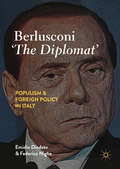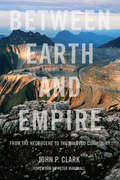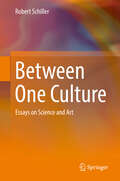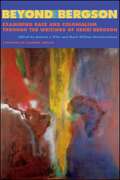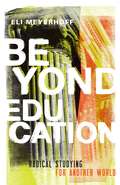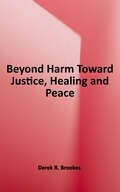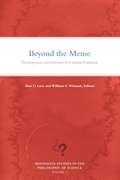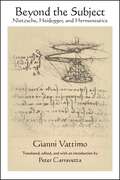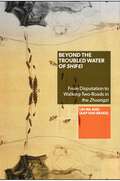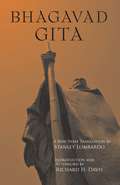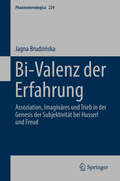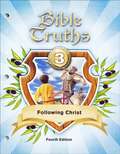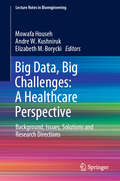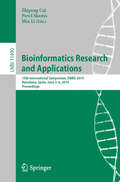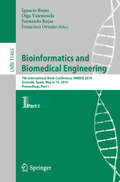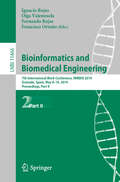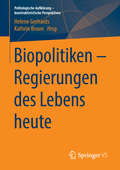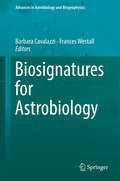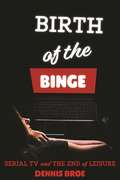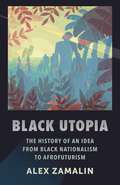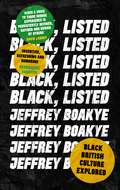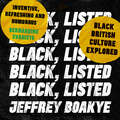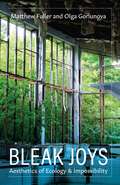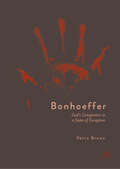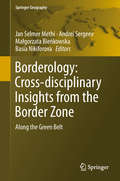- Table View
- List View
Berlusconi ‘The Diplomat’: Populism and Foreign Policy in Italy
by Emidio Diodato Federico NigliaThis book analyses the foreign policy of Silvio Berlusconi, Italian media tycoon and politician who served as Prime Minister of Italy in four governments. The authors examine the Italian position in the international arena and its foreign policy tradition, as well as Berlusconi’s general political stance, Berlusconi’s foreign policy strategies and the impact of those strategies in Italy. Given that Berlusconi is considered a populist leader, the volume considers his foreign policy as an instance of populist foreign policy – an understudied but increasingly relevant topic.
Between Earth and Empire: From the Necrocene to the Beloved Community
by John P. ClarkBetween Earth and Empire focuses on the crucial position of humanity at the present moment in Earth History. We have left the Cenozoic, the "new period of life," and are now in the midst of the Necrocene, a period of mass extinction and reversal of the course of evolution of life on Earth. It is argued that an effective response to global crisis requires attention to all major spheres of social determination, including the social institutional structure, the social ideology, the social imaginary, and the social ethos. In this wide-ranging and ruthlessly compassionate critique, John P. Clark explores examples of significant progress in this direction, including the Zapatista movement in Chiapas, the Democratic Autonomy Movement in Rojava, indigenous movements in defense of the commons, the solidarity economy movement, and efforts to create liberated base communities and affinity groups within anarchism and other radical social movements. In the end, the book presents a vision of hope for social and ecological regeneration through the rebirth of a libertarian and communitarian social imaginary, and the flourishing of a free cooperative community globally.
Between One Culture: Essays on Science and Art
by Robert SchillerThis book argues that science and the arts are not two different cultures, but rather different manifestations of the same culture. Divided into seven parts, it presents a collection of translated and revised essays, mostly at the intersection between realia and humaniora. In the first two parts, the author discusses how some myths, both ancient and modern, have become intertwined with scientific ideas. The chapters in the following four parts address poems, novels, plays, and pieces of fine art that have some scientific content, as well as scientific findings which seem to have also been discovered in art. The chapters in the final part examine a number of inspiring doubts and necessary errors in the history of science. This collection of essays, most of which were originally published in Hungarian, is intended for the general public and as such includes no mathematical, physical or chemical formulae. It offers a unique resource for all those curious about the interconnections between science, art and literature.
Beyond Bergson: Examining Race and Colonialism through the Writings of Henri Bergson (SUNY series, Philosophy and Race)
by Andrea J. Pitts; Mark William Westmoreland; Leonard LawlorBuilding upon recent interest in Henri Bergson's social and political philosophy, this volume offers a series of fresh and novel perspectives on Bergson's writings through the lenses of critical philosophy of race and decolonial theory. Contributors place Bergson's work in conversation with theorists from Africa, the African Diaspora, and Latin America to examine Bergson's influence on literature, science studies, aesthetics, metaphysics, and social and political philosophy within these geopolitical contexts. The volume pays particular attention to both theoretical and practical forms of critical resistance work, including historical analyses of anti-racist, anti-imperialist, and anti-capitalist movements that have engaged with Bergson's writings—for example, the Négritude movement, the Indigenismo movement, and the Peruvian Socialist Party. These historical and theoretical intersections provide a timely and innovative contribution to the existing scholarship on Bergson, and demonstrate the importance of his thought for contemporary social and political issues.
Beyond Education: Radical Studying for Another World
by Eli MeyerhoffA bold call to deromanticize education and reframe universities as terrains of struggle between alternative modes of studying and world-making Higher education is at an impasse. Black Lives Matter and #MeToo show that racism and sexism remain pervasive on campus, while student and faculty movements fight to reverse increased tuition, student debt, corporatization, and adjunctification. Commentators typically frame these issues as crises for an otherwise optimal mode of intellectual and professional development. In Beyond Education, Eli Meyerhoff instead sees this impasse as inherent to universities, as sites of intersecting political struggles over resources for studying.Meyerhoff argues that the predominant mode of study, education, is only one among many alternatives and that it must be deromanticized in order to recognize it as a colonial-capitalist institution. He traces how key elements of education—the vertical trajectory of individualized development, its role in preparing people to participate in governance through a pedagogical mode of accounting, and dichotomous figures of educational waste (the &“dropout&”) and value (the &“graduate&”)—emerged from histories of struggles in opposition to alternative modes of study bound up with different modes of world-making.Through interviews with participants in contemporary university struggles and embedded research with an anarchist free university, Beyond Education paves new avenues for achieving the aims of an &“alter-university&” movement to put novel modes of study into practice. Taking inspiration from Black Lives Matter, Occupy Wall Street, and Indigenous resurgence projects, it charts a new course for movements within, against, and beyond the university as we know it.
Beyond Harm: Toward Justice, Healing and Peace
by Derek R. BrookesWe have all been hurt by someone, in some cases very seriously. And we have all inflicted pain on someone else, even if it was unintended. The consequences have often been devastating, and continue to this day. We find ourselves 'stuck' in anger, fear, isolation, disbelief, bitterness, self-blame, denial, guilt, shame . . . the list is all too familiar. Our friends and family plead with us to 'move on' and 'put the past behind us'. But it's never that simple. There is no 'magic wand' that can instantly sweep away this kind of pain. <p><p>So what can we do? How can we find some peace? Is it possible to heal from what has happened? Would some kind of punishment make a difference? Do we need to forgive? Would an apology help? How can we find a way out of this agonising hurt and negativity? Will it ever be possible to 'make things right'? 'Beyond Harm' explores all of these questions, and offers a way forward. The first Part looks at what it means to be wronged, why it hurts so much. It sets out an explanation for why we react to wrongdoing in the ways that we do, so many of which only cause us more suffering and pain. And it offers an alternative: a kind of 'justice' that can bring the healing and peace that we crave. This is a response that honours our moral values and acknowledges our common humanity. It is also evidence-based: it takes seriously how we actually think and feel about wrongdoing. The second Part draws on the first by exploring what it would take for this alternative to become a reality. It shows how it is possible to 'make things right' by using a tried and tested practice called 'restorative justice', and what is needed for this approach to be safe and effective.
Beyond the Meme: Development and Structure in Cultural Evolution (Minnesota Studies in the Philosophy of Science #22)
by William C. Wimsatt Alan C. LoveInterdisciplinary perspectives on cultural evolution that reject meme theory in favor of a complex understanding of dynamic change over time How do cultures change? In recent decades, the concept of the meme, posited as a basic unit of culture analogous to the gene, has been central to debates about cultural transformation. Despite the appeal of meme theory, its simplification of complex interactions and other inadequacies as an explanatory framework raise more questions about cultural evolution than it answers. In Beyond the Meme, William C. Wimsatt and Alan C. Love assemble interdisciplinary perspectives on cultural evolution, providing a nuanced understanding of it as a process in which dynamic structures interact on different scales of size and time. By focusing on the full range of evolutionary processes across distinct contexts, from rice farming to scientific reasoning, this volume demonstrates how a thick understanding of change in culture emerges from multiple disciplinary vantage points, each of which is required to understand cultural evolution in all its complexity. The editors provide an extensive introductory essay to contextualize the volume, and Wimsatt contributes a separate chapter that systematically organizes the conceptual geography of cultural processes and phenomena.Any adequate account of the transmission, elaboration, and evolution of culture must, this volume argues, recognize the central roles that cognitive and social development play in cultural change and the complex interplay of technological, organizational, and institutional structures needed to enable and coordinate these processes.Contributors: Marshall Abrams, U of Alabama at Birmingham; Claes Andersson, Chalmers U of Technology; Mark A. Bedau, Reed College; James A. Evans, U of Chicago; Jacob G. Foster, U of California, Los Angeles; Michel Janssen, U of Minnesota; Sabina Leonelli, U of Exeter; Massimo Maiocchi, U of Chicago; Joseph D. Martin, U of Cambridge; Salikoko S. Mufwene, U of Chicago; Nancy J. Nersessian, Georgia Institute of Technology and Harvard U; Paul E. Smaldino, U of California, Merced; Anton Törnberg, U of Gothenburg; Petter Törnberg, U of Amsterdam; Gilbert B. Tostevin, U of Minnesota.
Beyond the Subject: Nietzsche, Heidegger, and Hermeneutics (SUNY series in Contemporary Italian Philosophy)
by Gianni VattimoIn Beyond the Subject Gianni Vattimo offers a reading of Nietzsche and Heidegger that shows how the premises to overcome the metaphysical Subject were already embedded in their thought. Vattimo makes a case for a Nietzsche who is not concerned with the structure and glorification of the Overman, but rather with its opposite, by showing how it is the single individual who must see and accept his/her potential and then excel and develop an inner strength and ethic. He reads Heidegger as concerned with the inevitable distortion present in every interpretation, which, when confronted and accepted, humbles us to deal with a less overarching telos or Grund, and makes us more attuned to contingency and interpersonal communication—what Vattimo calls a "weakened" notion of being. These original readings of Nietzsche and Heidegger pave the way for Vattimo's concept of weak thought and open up to a future social ethic that is less agonistic and more community oriented. This edition includes two supplementary essays from 1986 and 1988 that expand on the same themes, providing a deeper look at an important decade in the development of Vattimo's thought.
Beyond the Troubled Water of Shifei: From Disputation to Walking-Two-Roads in the Zhuangzi (SUNY series in Chinese Philosophy and Culture)
by Lin Ma Jaap van BrakelIn recent decades, a growing concern in studies in Chinese intellectual history is that Chinese classics have been forced into systems of classification prevalent in Western philosophy and thus imperceptibly transformed into examples that echo Western philosophy. Lin Ma and Jaap van Brakel offer a methodology to counter this approach, and illustrate their method by carrying out a transcultural inquiry into the complexities involved in understanding shi and fei and their cognate phrases in the Warring States texts, the Zhuangzi in particular. The authors discuss important features of Zhuangzi's stance with regard to language-meaning, knowledge-doubt, questioning, equalizing, and his well-known deconstruction of the discourse in ancient China on shifei. Ma and van Brakel suggest that shi and fei apply to both descriptive and prescriptive languages and do not presuppose any fact/value dichotomy, and thus cannot be translated as either true/false or right/wrong. Instead, shi and fei can be grasped in terms of a pre-philosophical notion of fitting. Ma and van Brakel also highlight Zhuangzi's idea of "walking-two-roads" as the most significant component of his stance. In addition, they argue that all of Zhuangzi's positive recommendations are presented in a language whose meaning is not fixed and that every stance he is committed to remains subject to fundamental questioning as a way of life.
Bhagavad Gita: A Biography (Lives Of Great Religious Bks. #23)
by Richard H. DavisStanley Lombardo's new verse translation of the most famous free-standing sequence from the great Indian epic The Mahabharata hews closely to the meaning, verse structure, and performative quality of the original and is invigorated by its judicious incorporation of key Sanskrit terms in transliteration, for which a glossary is also provided. The translation is accompanied by Richard H. Davis' brilliant Introduction and Afterword. The latter, "Krishna on Modern Fields of Battle," offers a fascinating look at the illuminating role the poem has played in the lives and struggles of a few of the most accomplished figures in recent world history.
Bi-Valenz der Erfahrung: Assoziation, Imaginäres und Trieb in der Genesis der Subjektivität bei Husserl und Freud (Phaenomenologica #229)
by Jagna BrudzińskaEdmund Husserls Phänomenologie und Sigmund Freuds Psychoanalyse sind zwei große Denktraditionen des 20. Jahrhunderts. Erstmals wird in diesem Buch die lebendige problemgebundene Beziehung zwischen beiden untersucht, und zwar ausgehend von Husserls genetischer Phänomenologie. Im Fokus stehen drei große Erfahrungsbereiche des Menschen: die Assoziation, die Phantasie und der Trieb. Wie sich zeigt, spielen alle drei eine Schlüsselrolle, sowohl für Husserls als auch für Freuds Denken.Die Autorin hat für ihre Studie veröffentlichte wie auch unveröffentlichte Texte aus dem Werk Husserls berücksichtigt und die Ergebnisse lassen die Phänomenologie in einem neuen Licht erscheinen. So rücken in diesem Buch, anders als im allgemein-philosophischen Verständnis von Intentionalität, spezifische Formen der phantasmatischen und imaginären Intentionalität in den Vordergrund. Auf diese Weise betrachtet, zeigt sich die subjektive Erfahrung als eine menschliche Entwicklungsstruktur, die unter einer doppelten Ordnung steht: Wir und unsere Welt sind nicht nur durch Wahrnehmung strukturiert, sondern auch durch imaginäre Leistungen, durch triebhafte Tendenzen und unbewusste Wünsche. Die Autorin findet dafür den Begriff der Bi-Valenz, der Zweiwertigkeit der personalen Realität.Mit dieser Untersuchung werden zwei Ziele erreicht. Einerseits befreit die Autorin das Trieb-Verständnis der Psychoanalyse von seinem naturalistischen Rest, andererseits eröffnet sie für die Phänomenologie einen neuen Bereich anschaulicher Erfahrung: das dynamische Unbewusste. Das Medium dieser Erfahrung ist eine starke, produktive Phantasie, die aus triebhaften Quellen schöpft und unsere Realität mit-gestaltet. Der Band richtet sich an Studierende und Wissenschaftler, die sich für genetische Phänomenologie und die Philosophie der Psychoanalyse interessieren.
Bible Truths 3: Following Christ
by Daryl KoppA doctrinal study including the nature and person of God, Creation, the fall of man, God's mercy, God's judgment, God's dealings with Israel and events from the life of Christ.
Big Data, Big Challenges: Background, Issues, Solutions and Research Directions (Lecture Notes in Bioengineering)
by Mowafa Househ Andre W. Kushniruk Elizabeth M. BoryckiThis is the first book to offer a comprehensive yet concise overview of the challenges and opportunities presented by the use of big data in healthcare. The respective chapters address a range of aspects: from health management to patient safety; from the human factor perspective to ethical and economic considerations, and many more. By providing a historical background on the use of big data, and critically analyzing current approaches together with issues and challenges related to their applications, the book not only sheds light on the problems entailed by big data, but also paves the way for possible solutions and future research directions. Accordingly, it offers an insightful reference guide for health information technology professionals, healthcare managers, healthcare practitioners, and patients alike, aiding them in their decision-making processes; and for students and researchers whose work involves data science-related research issues in healthcare.
Bioinformatics Research and Applications: 15th International Symposium, ISBRA 2019, Barcelona, Spain, June 3–6, 2019, Proceedings (Lecture Notes in Computer Science #11490)
by Min Li Pavel Skums Zhipeng CaiThis book constitutes the proceedings of the 15th International Symposium on Bioinformatics Research and Applications, ISBRA 2019, held in Barcelona, Spain, in June 2019. The 22 full papers presented in this book were carefully reviewed and selected from 95 submissions. They were organized in topical sections named: genome analysis; systems biology; computational proteomics; machine and deep learning; and data analysis and methodology.
Bioinformatics and Biomedical Engineering: 7th International Work-Conference, IWBBIO 2019, Granada, Spain, May 8-10, 2019, Proceedings, Part I (Lecture Notes in Computer Science #11465)
by Ignacio Rojas Francisco Ortuño Olga Valenzuela Fernando RojasThe two-volume set LNBI 11465 and LNBI 11466 constitutes the proceedings of the 7th International Work-Conference on Bioinformatics and Biomedical Engineering, IWBBIO 2019, held in Granada, Spain, in May 2019. The total of 97 papers presented in the proceedings, was carefully reviewed and selected from 301 submissions. The papers are organized in topical sections as follows: Part I: High-throughput genomics: bioinformatics tools and medical applications; omics data acquisition, processing, and analysis; bioinformatics approaches for analyzing cancer sequencing data; next generation sequencing and sequence analysis; structural bioinformatics and function; telemedicine for smart homes and remote monitoring; clustering and analysis of biological sequences with optimization algorithms; and computational approaches for drug repurposing and personalized medicine. Part II: Bioinformatics for healthcare and diseases; computational genomics/proteomics; computational systems for modelling biological processes; biomedical engineering; biomedical image analysis; and biomedicine and e-health.
Bioinformatics and Biomedical Engineering: 7th International Work-Conference, IWBBIO 2019, Granada, Spain, May 8-10, 2019, Proceedings, Part II (Lecture Notes in Computer Science #11466)
by Ignacio Rojas Francisco Ortuño Olga Valenzuela Fernando RojasThe two-volume set LNBI 11465 and LNBI 11466 constitutes the proceedings of the 7th International Work-Conference on Bioinformatics and Biomedical Engineering, IWBBIO 2019, held in Granada, Spain, in May 2019. The total of 97 papers presented in the proceedings, was carefully reviewed and selected from 301 submissions. The papers are organized in topical sections as follows: Part I: High-throughput genomics: bioinformatics tools and medical applications; omics data acquisition, processing, and analysis; bioinformatics approaches for analyzing cancer sequencing data; next generation sequencing and sequence analysis; structural bioinformatics and function; telemedicine for smart homes and remote monitoring; clustering and analysis of biological sequences with optimization algorithms; and computational approaches for drug repurposing and personalized medicine. Part II: Bioinformatics for healthcare and diseases; computational genomics/proteomics; computational systems for modelling biological processes; biomedical engineering; biomedical image analysis; and biomedicine and e-health.
Biopolitiken – Regierungen des Lebens heute: Regierungen Des Lebens Heute (Politologische Aufklärung – konstruktivistische Perspektiven)
by Helene Gerhards Kathrin BraunDas Buch versammelt konstruktivistische Perspektiven auf das Konzept „Biopolitik“. Dadurch werden die Analysepotentiale für aktuelle Phänomene, die den Zusammenhang zwischen dem Leben und dem Lebendigen und der Regierbarmachung betreffen, ausgelotet. Im Fokus stehen die Strategien und die Objekte der Regierungs- und Regulierungsbemühungen: In welcher Weise werden gesellschaftliche Probleme konstruiert und bestimmten „Zielscheiben“ zugeschrieben? Welche Subjektivierungsformen lassen sich im Rahmen biopolitischer Zugriffe ausmachen? Inwiefern spielen spezifische sozialtheoretische Überlegungen und Konzeptionen von Zeit für biopolitische Strategien und Konflikte eine Rolle? An welchen Gegenständen sind die fortdauernden Konflikte, die sich im Spannungsfeld zwischen Medizin, Ethik und Politik ergeben, zu explizieren?
Biosignatures for Astrobiology (Advances in Astrobiology and Biogeophysics)
by Barbara Cavalazzi Frances WestallThis book aims at providing a brief but broad overview of biosignatures. The topics addressed range from prebiotic signatures in extraterrestrial materials to the signatures characterising extant life as well as fossilised life, biosignatures related to space, and space flight instrumentation to detect biosignatures either in situ or from orbit. The book ends with philosophical reflections on the implications of life elsewhere. In the 15 chapters written by an interdisciplinary team of experts, it provides both detailed explanations on the nature of biosignatures as well as useful case studies showing how they are used and identified in ancient rocks, for example. One case study addresses the controversial finding of traces of fossil life in a meteorite from Mars. The book will be of interest not only to astrobiologists but also to terrestrial paleontologists as well as any reader interested in the prospects of finding a second example of life on another planet.
Birth of the Binge: Serial TV and the End of Leisure (Contemporary Approaches to Film and Media Series)
by Dennis BroeBirth of the Binge: Serial TV and the End of Leisure describes and details serial television and "binge watching," the exceedingly popular form of contemporary television viewing that has come to dominance over the past decade. Author Dennis Broe looks at this practice of media consumption by suggesting that the history of seriality itself is a continual battleground between a more unified version of truth-telling and a more fractured form of diversion and addiction. Serial television is examined for the ways its elements (multiple characters, defined social location, and season and series arcs) are used alternately to illustrate a totality or to fragment social meaning. Broe follows his theoretical points with detailed illustrations and readings of several TV series in a variety of genres, including the systemization of work in Big Bang Theory and Silicon Valley; the social imbrications of Justified; and the contesting of masculinity in Joss Whedon’s Buffy the Vampire Slayer, Firefly, and Dollhouse. In this monograph, Broe uses the work of Bernard Stiegler to relate the growth of digital media to a new phase of capitalism called "hyperindustrialism," analyzing the show Lost as suggestive of the potential as well as the poverty and limitations of digital life. The author questions whether, in terms of mode of delivery, commercial studio structure, and narrative patterns, viewers are experiencing an entirely new moment or a (hyper)extension of the earlier network era. The Office, The Larry Sanders Show, and Orange Is the New Black are examined as examples of, respectively, network, cable, and online series with structure that is more consistent than disruptive. Finally, Broe examines three series by J. J. Abrams—Revolution, Believe, and 11.22.63—which employ the techniques and devices of serial television to criticize a rightward, neo-conservative drift in the American empire, noting that none of the series were able to endure in an increasingly conservative climate. The book also functions as a reference work, featuring an appendix of "100 Seminal Serial Series" and a supplementary index that television fans and media students and scholars will utilize in and out of the classroom.
Black Utopia: The History of an Idea from Black Nationalism to Afrofuturism
by Alex ZamalinWithin the history of African American struggle against racist oppression that often verges on dystopia, a hidden tradition has depicted a transfigured world. Daring to speculate on a future beyond white supremacy, black utopian artists and thinkers offer powerful visions of ways of being that are built on radical concepts of justice and freedom. They imagine a new black citizen who would inhabit a world that soars above all existing notions of the possible.In Black Utopia, Alex Zamalin offers a groundbreaking examination of African American visions of social transformation and their counterutopian counterparts. Considering figures associated with racial separatism, postracialism, anticolonialism, Pan-Africanism, and Afrofuturism, he argues that the black utopian tradition continues to challenge American political thought and culture. Black Utopia spans black nationalist visions of an ideal Africa, the fiction of W. E. B. Du Bois, and Sun Ra’s cosmic mythology of alien abduction. Zamalin casts Samuel R. Delany and Octavia E. Butler as political theorists and reflects on the antiutopian challenges of George S. Schuyler and Richard Wright. Their thought proves that utopianism, rather than being politically immature or dangerous, can invigorate political imagination. Both an inspiring intellectual history and a critique of present power relations, this book suggests that, with democracy under siege across the globe, the black utopian tradition may be our best hope for combating injustice.
Black, Listed: Black British Culture Explored
by Jeffrey BoakyeAFRO-CARIBBEAN. COLOURED. ETHNIC MINORITY. IMMIGRANT. BAME. URBAN. WOKE. FAM. BLACK.These are just some of the terms being wrestled with in Black, Listed, an exploration of twenty-first century Black identity told through a list of insults, insights and everything in between. Taking a panoramic look at global Black history and contemporary culture, this book investigates the ways in which Black communities (and individuals) have been represented, oppressed, mimicked, celebrated and othered. Part autobiographical musing, part pop culture vivisection, it's a comprehensive attempt to make sense of blackness from the vantage point of the hilarious and insightful psyche of Jeffrey Boakye. PRAISE FOR BLACK, LISTED: 'This book gives a voice to those whose experience is persistently defined, refined and denied by others' David Lammy, Guardian 'A panoramic exploration of black identity' Elle'Urgent, timely reading' AnOther Magazine 'Inventive, refreshing and humorous' Bernardine Evaristo, author of Girl, Woman, Other 'A truly radical book, which manages to be unflinching and constantly entertaining' Caroline Sanderson, The Bookseller
Black, Listed: Black British Culture Explored
by Jeffrey BoakyeGUARDIAN MUST READ BOOKS OF 2019 FINANCIAL TIMES BOOKS TO READ 2019 NEW STATESMAN MUST READS 2019'A truly radical book, which manages to be unflinching and constantly entertaining' CAROLINE SANDERSON, THE BOOKSELLER BOOK OF THE MONTH APRIL 2019'This book gives a voice to those whose experience is persistently defined, refined and denied by others' DAVID LAMMY, GUARDIAN *Who is a roadman really? What's wrong with calling someone a 'lighty'? Why do people think black guys are cool?These are just some of the questions being wrestled with in Black, Listed, an exploration of 21st century black identity told through a list of insults, insights and everything in-between.Taking a panoramic look at global black history, interrogating both contemporary and historical culture, Black, Listed investigates the ways in which black communities (and individuals) have been represented, oppressed, mimicked, celebrated, and othered. Part historical study, part autobiographical musing, part pop culture vivisection, it's a comprehensive attempt to make sense of blackness from the vantage point of the hilarious and insightful psyche of Jeffrey Boakye. Along the way, it explores a far reaching range of social and cultural contexts, including but not limited to, sport, art, entertainment, politics, literature, history, music, theatre, cinema, education and criminal justice, sometimes at the same time.
Bleak Joys: Aesthetics of Ecology and Impossibility (Posthumanities #53)
by Matthew Fuller Olga GoriunovaA philosophical and cultural distillation of the bleak joys in today&’s ambivalent ecologies and patterns of lifeBleak Joys develops an understanding of complex entities and processes—from plant roots to forests to ecological damage and its calculation—as aesthetic. It is also a book about &“bad&” things, such as anguish and devastation, which relate to the ecological and technical but are also constitutive of politics, the ethical, and the formation of subjects.Avidly interdisciplinary, Bleak Joys draws on scientific work in plant sciences, computing, and cybernetics, as well as mathematics, literature, and art in ways that are not merely illustrative of but foundational to our understanding of ecological aesthetics and the condition in which the posthumanities are being forged. It places the sensory world of plants next to the generalized and nonlinear infrastructure of irresolvability—the economics of indifference up against the question of how to make a home on Planet Earth in a condition of damaged ecologies. Crosscutting chapters on devastation, anguish, irresolvability, luck, plant, and home create a vivid and multifaceted approach that is as remarkable for its humor as for its scholarly complexity.Engaging with Deleuze, Guattari, and Bakhtin, among others, Bleak Joys captures the modes of crises that constitute our present ecological and political condition, and reckons with the means by which they are not simply aesthetically known but aesthetically manifest.
Bonhoeffer: God’s Conspirator in a State of Exception
by Petra BrownTheologian. Conspirator. Martyr. Saint. Dietrich Bonhoeffer was killed in the waning days of World War II, having been implicated in the July 20th assassination attempt on Hitler. Since his death, Bonhoeffer’s life and writings have inspired contradictory responses. He is often seen as a model for Christian pacifist resistance, and more recently for violent direct political action. Bonhoeffer’s name has been invoked by violent anti-abortion protestors as well as political leaders calling for support on a ‘war on terror’ in the aftermath of 9/11. Petra Brown critically analyses Bonhoeffer’s writing preceding and during his conspiracy involvement, particularly his recurring concept of the ‘extraordinary.’ Brown examines this idea in light of ‘the state of exception,’ a concept coined by the one-time Nazi jurist and political theorist, Carl Schmitt. She also draws on the existentialist philosopher Sören Kierkegaard to consider what happens when discipleship is understood as obedience to a divine command. This book aims to complicate an unreflective admiration of Bonhoeffer’s decision for conspiracy, and draws attention to the potentially dangerous implications of his emerging political theology.
Borderology: Along the Green Belt (Springer Geography)
by Jan Selmer Methi Andrei Sergeev Małgorzata Bieńkowska Basia NikiforovaThis book provides a unique and multifaceted view on and understanding of borders and their manifestations: physical and mental, cultural and geographical, and as a question of life and death. It highlights the Green Belt along the Iron Curtain, which offered a haven for rare species for many decades and, after the Cold War, became a veritable treasure trove for a European network of researchers. A geographical border is something that can be seen, but other borders sometimes have to be crossed to be discovered. The border zone is an arena for development that is not found in any other places. This book focuses on borderology, which became the name of a cross-border study and research program that explores the border zone from multiple perspectives. This cross-disciplinary book will appeal to interested researchers and students from many fields, from philosophy and diplomacy to ecology and geography.
